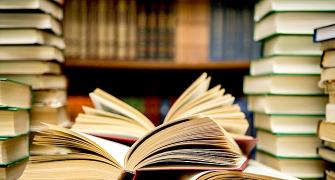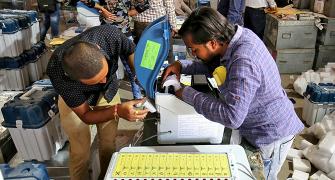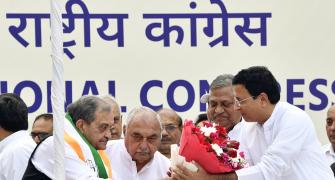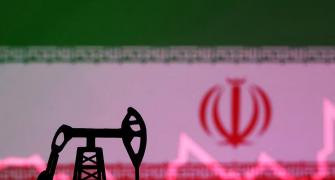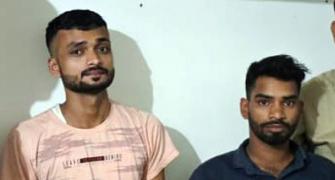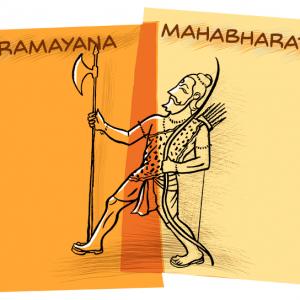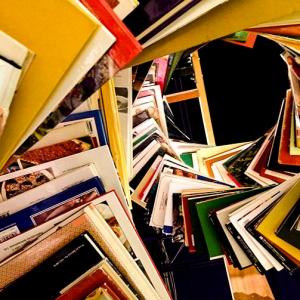One way to begin would be to access the material of our own culture, meaning the literature of India, recommends Aakar Patel.
Illustration: Uttam Ghosh/Rediff.com
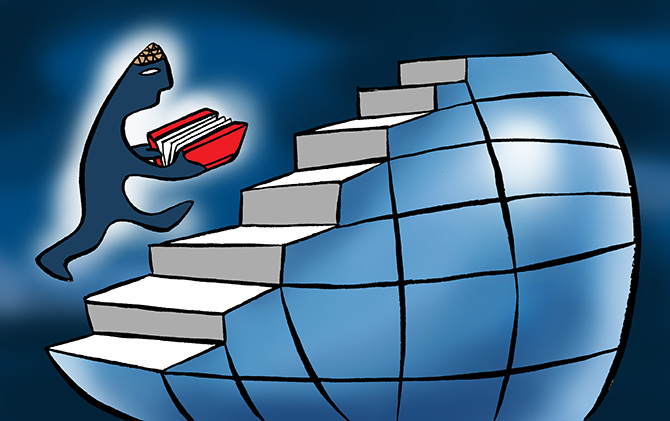
We live in a time when the young do not read as much as the generation before them.
By 'read', of course, is meant the sort of formal, didactic material that we associate with the idea of reading.
Because it's possible and perhaps even likely that purely in terms of poring through textual material in these times of social media the young are 'reading' as much as they have ever been.
But if we accept the fact that they do not read much and particularly so at a young age, I would say the teen years, when their minds are in a formative stage, but also for people older, what sort of books should they be reading?
This piece addresses that from personal experience and may prove to be useful for someone who is wondering about similar things.
Very briefly, my experience as a reader would echo that of any other middle-class individual of my age and the writers I accessed (Blyton, Dixon, Keene, Sheldon, Wallace, Wodehouse, Hadley Chase) were household names among the Anglicised Indian class, which was much smaller three decades ago than it is now.
Till I was in my 20s, this is the sort of thing I usually read and enjoyed and I am glad to have had access to this material.
The really didactic stuff came later, from my mid 20s onwards, as I tried to educate myself on the world around us.
I did this through a particular approach and that was to read chronologically, to read mainly primary sources and to read through one culture's material for at least a year before moving on.
I recognise that many might not have either the interest, time or patience to do this. I did it for India, ancient Greece and Rome and found the experience very rewarding.
One way to begin would, of course, be to access the material of our own culture, meaning the literature of India and these parts.
I would suggest beginning with the Digha Nikaya. This Pali work is the long discourses or dialogues of the Buddha.
With a simple narrative style and plenty of physical observations, this is to my mind the most readable and the greatest of all the Buddhist works.
It is available in English as part of Max Müller's Sacred Works of the East series, which has 50 volumes in all.
For those who are curious, the Buddha is occupied by the same questions as other minds of his time, like Plato.
To some extent, the questions he grapples with are also relevant today: Is the universe eternal?
Is it infinite?
Is the soul eternal?
Is it separate from the body?
If we still wonder about the same things today, it shows how little we actually know.
The Buddha's answer was: We don't have enough information, and so long as we don't, these things are unimportant.
He urges us, therefore, to ignore the world and look inward for answers instead. I think this is a lethal teaching, which is at least in part responsible for India's problems.
Any chronological approach to scaling India's literary mountain must almost immediately run into religious texts. The earliest being the Rig Veda.
I would give the Vedas a pass, as also the Upanishads, and set these aside to be accessed at a time when there is more interest in that specific material. It is far too niche and often too boring to hold the casual reader.
We should move instead to The Ramayan and then The Mahabharata. In this order because The Ramayan is a much shorter text and there will be a sense of accomplishment on reading it. The latest translation of the Valmiki Ramayana is by my friend Arshia Sattar and it is highly recommended.
The translation is first rate, but Valmiki's observational ability is poor and so the work is lacking in the sort of details a modern reader expects and anticipates.
One chapter is the exception, the sensational one where Hanuman records the exhausted state of Ravana and his harem after a prolonged orgy. This particular translation also leaves out one telling detail from the Ashwamedha.
Rama's mother Kaushalya despatches a horse, separating its neck from its shoulder with three sword blows. This tells us more about her than all the verses testifying to her piety.
The Mahabharata in full is very long and very unreadable for the casual reader. It has 17 volumes in the series by the Writers Workshop of Kolkata (and if I remember it right, that is an unfinished work).
More recently, Bibek Debroy, the prime minister's economic advisor, has also had a stab at it. I have myself not read the thing in full, but have set it aside as something to be done in retirement.
Once one leaves the mythological and religious and seeks primary texts of non-fiction, the list from India gets very thin.
The two oldest memoirs are Babur's from the 1520s, and another from about a century after that. This book, named Ardhakathanak, was written by the trader Banarasidas during Jahangir's reign. It's not as good a work as that of Babur, who was a magnificent writer -- every bit as good and as modest as Julius Caesar -- but Banarasidas is readable and illuminating in many ways.
Akbar was illiterate (he was apparently dyslexic) but his son Jahangir has written a fabulous memoir. The secretive Shah Jahan left nothing behind.
One wishes Aurangzeb had written, for two reasons. He could have told us what he was like in the first person, which always makes a difference, particularly when someone is as demonised as he is.
Secondly, because his biographer Jadunath Sarkar has said that Aurangzeb was a highly skilled writer (he replied to letters on the same paper, writing diagonally in his own hand, and often in rhyming couplets).
I have little interest in verse but the most sensual and erotic poetry I have read -- in any language -- is the Gatha Saptashati, written by Hala over 1,500 years ago in Marathi Prakrit. Adult readers will enjoy it.
The Greeks do not have the problem that we do and there are plenty of primary texts that are easy to read and available.
One can read the Greeks chronologically, beginning with Homer. Then comes Herodotus, the father of history, in whose work is the story of Persia's invasion of 490 BC, which concludes when the Greeks are defeated at Thermopylae.
After this was written one of the greatest works of history I have ever read, Thucydides' History of the Peloponnesian War. Written with a cold and observant eye, he describes the savage struggle between Athens and Sparta.
Athenians loved theatre and the principal works of their playwrights have survived after 2,300 years. These writers were the tragedians Aeschylus, Sophocles and Euripides, and the comic Aristophanes, who is my favourite writer of plays, better than Shakespeare.
After the playwrights came the philosophers. First Socrates, who wrote nothing but was made immortal by his student Plato, and then Aristotle, the two most important writers in the world.
Plato is the origin of Christianity's heaven and hell, and of Islam's Sufism. That alone should tempt many people to read him, as it did me.
I will stop here to ask: What else should one read?
My experience is that when one begins with such lists, one inevitably discovers where to go next.
And so the advice is to just begin. The rest will fall into place as you discover the world.


